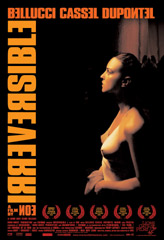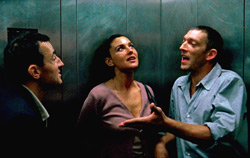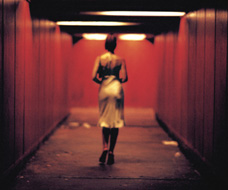|
Irréversible
|
| |
 |
French language. France, 2002. Not rated.
94 minutes.
Cast:
Monica Bellucci, Vincent Cassel, Albert Dupontel, Joe Prestia, Philippe
Nahon, Stéphane Drouot, Jean-Louis Costes, Mourad Khima
Writer: Gaspar Noé
Music: Thomas Bangalter
Cinematographers: Benoît Debie, Gaspar Noé
Producer: Christophe Rossignon
Director: Gaspar Noé
LINKS
|
 e have
an early winner for Least Likely to Be Named Feel-Good Movie of the Year. Irréversible
is an nihilistic, repellent depiction of rape and--to borrow the words of a
character--"fucking B-movie revenge crap" that offers little insight into the
human condition. Were it not for arresting experimental filmmaking and unexpected
tenderness and beauty at the end, Irréversible would be an easy film
to dismiss as another sex-shock picture from France (e.g., Romance),
where sex is always an expression of social politics and human unhealthiness.
Admittedly, the French attitude is probably more realistic that the often sterile
view of sexuality on display in American films.
e have
an early winner for Least Likely to Be Named Feel-Good Movie of the Year. Irréversible
is an nihilistic, repellent depiction of rape and--to borrow the words of a
character--"fucking B-movie revenge crap" that offers little insight into the
human condition. Were it not for arresting experimental filmmaking and unexpected
tenderness and beauty at the end, Irréversible would be an easy film
to dismiss as another sex-shock picture from France (e.g., Romance),
where sex is always an expression of social politics and human unhealthiness.
Admittedly, the French attitude is probably more realistic that the often sterile
view of sexuality on display in American films.
The title, Irréversible, refers to both time and human actions. Writer/director
Gaspar Noé has chosen to reverse his chronology nonetheless, with a narrative
structure ripped off from Memento. This
appears a gimmick designed to hide the near-lack of a story. In Memento,
the reverse narrative served a purpose by mimicking the state of mind of the
forgetful protagonist and putting us in his situation--ignorant of what has
gone before and hungering to put together the jumbled pieces of the jigsaw puzzle.
In contrast, writer/director Gaspar Noé's tale is extremely simple, so simple
that it is no surprise Noé had a budget, a cast, and a shooting schedule before
he began work in earnest on the screenplay. Had Irréversible been told
chronologically, it would have amounted to an exploitative snuff film.
After an opening scene with a inadvisedly shirtless Philippe Nahon, whose character
has just been released from jail for raping his daughter and has only a thematic
connection to the rest of the story, the film begins with Marcus (Vincent Cassel)
exiting a gay sex club named "Le Rectum" on a stretcher, and his friend Pierre
(Albert Dupontel) being led out in handcuffs. We go back in time with a dizzying
spinning camera sequence--nothing much is discernible--and meet Marcus and Pierre
as they enter the club looking for someone called "Le Tenia" (Joe Prestia).
The camera does not shy away from any of the extremely lewd activity going on
in the club. The scene concludes with Pierre bashing a man's skull to fragments
and pulp with a fire extinguisher. The special effect would be remarkable (there
appear to be no cuts) if the scene left you capable of feeling anything other
than queasiness.
Working backward, we learn that Pierre and Marcus are seeking revenge for the
brutal rape of Marcus's Italian girlfriend, Alex (Monica Bellucci). Then we
see the rape itself,  a
disconcertingly graphic scene that goes on for about ten minutes in a reddish
subterranean underpass, during which Le Tenia overpowers her, ravages her, and
beats her senseless. It's much more disturbing than even the incestuous scene
in The War Zone. Next we visit the party
from where Alex came, wearing a breathtaking dress custom-designed for the film,
and see her leave early because Vincent is behaving like a jerk. Going further
back, we visit Vincent and Alex at home that afternoon, before some drug turns
Vincent into an Insta-Asshole, and reach the film's final mini-revelation.
a
disconcertingly graphic scene that goes on for about ten minutes in a reddish
subterranean underpass, during which Le Tenia overpowers her, ravages her, and
beats her senseless. It's much more disturbing than even the incestuous scene
in The War Zone. Next we visit the party
from where Alex came, wearing a breathtaking dress custom-designed for the film,
and see her leave early because Vincent is behaving like a jerk. Going further
back, we visit Vincent and Alex at home that afternoon, before some drug turns
Vincent into an Insta-Asshole, and reach the film's final mini-revelation.
To be fair, the reverse chronology does more than dress up the narrative in
fancy clothes. Because the characters are not yet established when the horrific
violence takes place, the violence is a bit easier to tolerate. By putting the
quiet and tender domestic scene at the end of the film, Noé relieves the bleak
tone and leaves us on a positive note--as long as you don't think about how
everything is about to be destroyed. Additionally, it is worth noting that most
real-world stories of violence and destruction are divulged to us along a similar
timeline. News reporting always begins with the final act, and only then--once
a violent end has made a victim newsworthy--do we work backwards through a person's
life to discover who they were. So the structure is not a reason the film doesn't
work. It makes the film works better.
No, the problem with Irréversible is that for an hour, Noé taps into
exactly one emotion: revulsion.
Why does a filmmaker choose to revolt an audience? There can be one of only
two reasons. Either he is indulging some sickening personal fetish (we can,
hopefully, exclude this possibility), or he has some point to make. What point
could Noé have? There aren't many options here either. Irréversible offers
the message, "Time destroys all things." Yet the characters people aren't destroyed
by time, other than in the sense that everything is destroyed by time. Time
elapses as events come to pass, but time itself is not to blame here. It is
the destructive violence of men.
Given that Pierre and Marcus's revenge is as disturbing as the rape itself,
Noé suggests we have a violent animal nature--all of us, both the privileged
and the denizens of the underworld. Noé seems to believe it is necessary to
instruct us--his innocent, sheltered audience--in the harsh realities of the
world. If there are people who genuinely don't understand that their happy,
normal lives are built on a paper-thin veneer of civilization laid over the
darker elements of human nature, then okay. Noé is here to remind us the world
is ugly. That'll be ten bucks, please, and would you like some popcorn with
your nausea? For people to sully themselves willingly with such unpleasant material,
Noé should present greater insights than this and offer some kind of emotional
catharsis.
Making Irréversible less palatable is its inescapable homophobia. Noé
has made the rapist homosexual--mostly, anyway. Le Tenia pimps for transsexual
prostitutes and frequents a frighteningly repulsive gay club. He comments how
he doesn't "normally do this" while he rapes Alex, and violates her anally,
making additional comments that suggest a predominantly gay sexual habits. Then
there's the barrage of anti-homosexual invective from Marcus as he seeks to
hunt Le Tenia down.
More alarmingly, Irréversible teeters close to blaming its victims.
Once we get to know Alex, she seems startlingly naïve in light of what is about
to happen to her, and her choice of attire appears unwise. Concerning relationships
between men and women, she says things like, "It's always the woman who decides,"
and, "Sometimes the pleasure that the woman feels is the pleasure that the man
feels."  This
from a woman who is about to have choice stripped away from her and experience
absolutely no pleasure at her rapist's pleasure. The story is going to teach
her about the how things really are, just like Noé is teaching you. And why
in the world is she dumb enough to take the stupid underpass? There isn't that
much traffic on the street. This is one of those instances where the man behind
the curtain--the director/writer--is too much in evidence. She takes the underpass
only because Noé needs her in a dangerous, isolated place. Finally, we have
the unsympathetic men. For most of the film, Marcus is a hateful character,
and once we've backed up in time enough to discover his softer side, Pierre
turns out to be a drip--a wet blanket who still pines for his ex and demands
to know inappropriately intimate details about her life.
This
from a woman who is about to have choice stripped away from her and experience
absolutely no pleasure at her rapist's pleasure. The story is going to teach
her about the how things really are, just like Noé is teaching you. And why
in the world is she dumb enough to take the stupid underpass? There isn't that
much traffic on the street. This is one of those instances where the man behind
the curtain--the director/writer--is too much in evidence. She takes the underpass
only because Noé needs her in a dangerous, isolated place. Finally, we have
the unsympathetic men. For most of the film, Marcus is a hateful character,
and once we've backed up in time enough to discover his softer side, Pierre
turns out to be a drip--a wet blanket who still pines for his ex and demands
to know inappropriately intimate details about her life.
The beauty of the ending transforms it from a despicable waste of time into
something more worthwhile, even if you can't exactly enjoy it. A segment opens
with Marcus and Alex asleep in bed, naked, clearly spent from having made love.
Alex is lying directly on top of him, with her head on his chest, a look of
utter peace on her face. They wake, and talk, and play, naked all the while,
before Alex heads to the shower and Marcus out the door to buy some wine. Here
is why Noé wanted to cast a real-life couple. Bellucci and Cassel are married,
and their complete lack of self-consciousness with one another cannot be faked.
The room is suffused with warmth, and the unaffected realism of the scene is
striking. Most of the dialogue is improvised; they talk as real people talk.
But, of course, this scene is the beginning of the story, and so on top of being
disgusting, the fate of the players is now tragic.
Noé's technique, and that of the actors, is also a marvel, though it may not
occur to you until after the fact. The segments of the film average ten minutes
in length apiece, and each is comprised of a single long take that covers a
great deal of ground and activity--several encounters over two floors in the
jarring sequence at Le Rectum, for example, or the entirety of a trip on the
subway. Some cheating was done in post-production to remove boom mikes and the
like, but not much. The camera is spinning and moving the whole time, coming
to rest on the ground for the first time during Alex's rape in order to observe
the graphic scene more dispassionately. Often the camera suggests going back
in time by spinning counterclockwise, most notably as it focuses on a sprinkler
at the end.
Noé fancies himself a Kubrick. Stanley Kubrick is his idol, and the final shot
pans over a giant poster of 2001: A Space Odyssey.
The idea of using a real-life couple suggests Eyes
Wide Shut, and the opening score with its thumping drum is very Kubrickian
indeed. Noé is obviously seeking to challenge and upset his audience in the
same way Kubrick would. The simplistic, straightforward content of Irréversible,
however, pales in comparison to the thematic sophistication and complexity of
Kubrick's work.
Irréversible is designed to be a polarizing film--Noé has said as much.
He was elated when, after an early screening for the Cannes Selection Committee,
reactions were passionately positive or passionately negative, "all black or
all white." This makes Irréversible an ideal movie to be distributed
by Lions Gate Films, which has made a name for itself by taking on projects
other studios won't handle, like Romance,
O, The Grey Zone, The
Rules of Attraction, Secretary,
and Monster's Ball. They take risks, and so has Noé. That is to be commended.
The nature of risk-taking, however, is that the risk can fail. Perhaps one day
Irréversible will be remembered as a masterpiece. Less deserving films
have earned that label, but when the film is designed mostly to shock, as is
the case here, it seems unlikely.
Review
© March 2003 by AboutFilm.Com and the author.
Images © 2003 Lions Gate Films. All Rights Reserved.

 a
disconcertingly graphic scene that goes on for about ten minutes in a reddish
subterranean underpass, during which Le Tenia overpowers her, ravages her, and
beats her senseless. It's much more disturbing than even the incestuous scene
in
a
disconcertingly graphic scene that goes on for about ten minutes in a reddish
subterranean underpass, during which Le Tenia overpowers her, ravages her, and
beats her senseless. It's much more disturbing than even the incestuous scene
in  This
from a woman who is about to have choice stripped away from her and experience
absolutely no pleasure at her rapist's pleasure. The story is going to teach
her about the how things really are, just like Noé is teaching you. And why
in the world is she dumb enough to take the stupid underpass? There isn't that
much traffic on the street. This is one of those instances where the man behind
the curtain--the director/writer--is too much in evidence. She takes the underpass
only because Noé needs her in a dangerous, isolated place. Finally, we have
the unsympathetic men. For most of the film, Marcus is a hateful character,
and once we've backed up in time enough to discover his softer side, Pierre
turns out to be a drip--a wet blanket who still pines for his ex and demands
to know inappropriately intimate details about her life.
This
from a woman who is about to have choice stripped away from her and experience
absolutely no pleasure at her rapist's pleasure. The story is going to teach
her about the how things really are, just like Noé is teaching you. And why
in the world is she dumb enough to take the stupid underpass? There isn't that
much traffic on the street. This is one of those instances where the man behind
the curtain--the director/writer--is too much in evidence. She takes the underpass
only because Noé needs her in a dangerous, isolated place. Finally, we have
the unsympathetic men. For most of the film, Marcus is a hateful character,
and once we've backed up in time enough to discover his softer side, Pierre
turns out to be a drip--a wet blanket who still pines for his ex and demands
to know inappropriately intimate details about her life.
